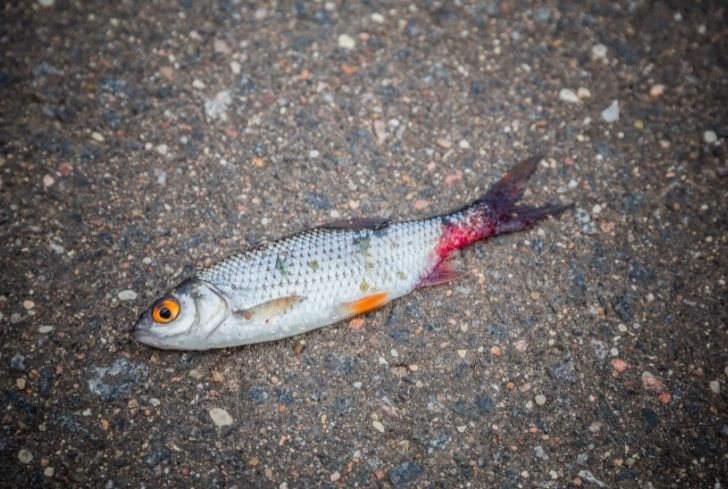A dog’s appetite knows no bounds as they eat things that you and I would never imagine eating. For instance, they chew on toys, pillows, paper, clothes, and just about anything that they can find! Although it makes them seem more adorable, dogs can eat things that can actually get dangerous for them.
Sometimes, even the strong odor of rotting and dead meats and fish that we find repulsive attracts dogs. Hence, if your dog has eaten rotten fish, worry not. This article will tell you all that you need to know – what to do and expect, how to prevent it from happening again, and more.
Contents
What Should You Do If Your Dog Ate a Rotten Fish?
First of all, you need not panic if your dog eats rotten fish or anything else that it is not supposed to. There are some steps that you can take to prevent any trouble or sickness.
Here is what you should do if your dog eats a rotten fish:
1. Command Them To Spit Out the Fish
The easiest way to prevent your dog from eating rotten fish is by commanding them not to. Simply command the dog to ‘leave it’ or ‘drop it’ (i.e the fish) so that they don’t chew it further and risk getting sick or poisoned.
If you have never taught your dog this command, you should definitely start today.
Dogs have a strong sense of odor and may be attracted to foods that human beings consider inedible. Teaching your dog to drop and leave such foods will save you a lot of hassle and potentially dangerous incidents in the future.
2. Rinse Your Dog’s Mouth
Eating rotten fish or any animal for that matter can pose serious risks. These animals may have parasites and bacteria that cause infections. Rinsing your dog’s mouth can help prevent these infections from spreading. Simply add a pinch of salt or baking soda and clean your dog’s mouth with it.
Additionally, rotten fish may also contain bones that can choke and injure your dog. So, you should also check your dog’s mouth for any pieces of bones and gently take them out.
3. Determine How Much Rotten Fish They Ate
If you catch your dog licking or nibbling on a very small piece of rotten fish, you do not need to worry. A small amount will likely not cause any serious trouble or sickness.
However, if your dog eats a substantial amount of rotten fish, you should keep an eye out for symptoms of disease, constipation, or poisoning. The more rotten fish your dog ate, the higher the risk of having serious consequences!
4. Contact a Veterinarian
It is best to not leave things for guessing and get medical assistance. Eating rotten fish can cause stomach and digestive problems and expose your dog to bacteria and parasites. So, if your dog seems to be excessively sick or uncomfortable, you should immediately take them to a veterinarian and get them tested for any diseases.
Can Your Dog Become Sick by Eating Dead Fish on the Beach?
Eating dead fish can be extremely dangerous and can make your dog sick. Here are some things to look out for if your dog eats a dead fish at the beach:
1. Dead Animals Often Carry Parasites That Can Seriously Damage Your Dog’s Health
By eating a dead fish, your dog may contract roundworm, which can leech off nutrients from its intestines. Hence, a dog exposed to roundworm may get sick even if it has a healthy diet.
2. Dead Fish May Transfer Poisonous Compounds to Your Dog Upon Eating
If a fish or any other animal dies due to being poisoned, it may transfer these harmful chemicals to your dog.
3. Eating Dead Fish Can Produce a Number of Symptoms That You Should Look Out For
Your dog may not contract any serious diseases or pathogens, but eating dead fish can still make them sick. You may notice vomiting, loss of appetite, swelling, etc. Do not ignore these symptoms and contact your veterinarian as soon as you can.
What Could Happen if Your Dog Swallowed Rotten Fish?
There are a few things that can happen in the event of your dog eating a rotten fish:
1. Sickness or No Sickness
If your dog eats a large amount of rotten fish, it may experience symptoms of food poisoning. These include vomiting, lethargy, constipation, excessive thirst, etc.
Your dog may also get exposed to any bacteria or pathogens if the fish was carrying them. This may produce more severe symptoms like abdominal swelling, loss of weight, bleeding, etc.
If you notice any of these symptoms in your dog after they eat rotten fish, you should take them to your veterinarian and follow their advice.
However, there is also a possibility that eating rotten fish may not harm your dog. This is more likely if your dog only eats a small amount of rotten fish. They might experience some discomfort but their body can deal with a small amount of bad food without causing sickness.
But, this does not mean that you should not monitor your dog’s health for any signs of sickness or food poisoning unless they eat a huge amount of spoiled or dead fish.
2. Swallowing Bones or Not
Although it may seem like dogs will easily be able to chew through fish bones, this is not the case. Fishbones are brittle and can be potentially dangerous.
Their sharp ends can puncture your dog’s throat, mouth, intestines, stomach, and other organs. Additionally, they also pose a choking hazard. So, the next section of this article is a step-by-step explanation of what to do if your dog has swallowed fish bones.
However, there is also a possibility that your dog will be able to swallow and digest fish bones with ease. This can happen if the bone is small in size and not sharp.
There are a few measures explained below that you can take so that swallowing a fish is not as hazardous for your dog.
What Could Happen if Your Dog Swallowed Fish Bones?
Fishbones are dangerous for both dogs and humans alike. Although dogs can chew on other bones, fish bones break easily and can cause choking or other serious problems.
If you find that your dog has swallowed a fishbone, here is what you should do:
1. Look For Signs of Choking
The first thing that you should do is look for signs of choking.
Fishbones are small and almost undetectable. They break easily upon chewing and can get stuck in your dog’s mouth or throat. This poses the risk of choking or punctures.
Even if you do not notice your dog having any difficulty in breathing, it is best to check your dog’s mouth for any pieces of fish bones. Carefully remove the bone and look for any punctures or wounds that need to be attended to.
2. Look For Signs of Pain
If the bone is very small in size, your dog may swallow it without a problem. However, the risk of internal bleeding and organs getting punctured stills remains.
Also, if your dog shows signs of being in pain after swallowing a fishbone, you should contact a veterinarian immediately. Some other symptoms to look out for are coughing, loss of appetite, restlessness, digestive problems, etc.
3. Help The Bone Pass Through
Although you should get medical assistance as soon as you see your dog exhibiting any of the signs mentioned above, it is unlikely for a fishbone to cause too much trouble.
Most of the time, the bone will be small enough for your dog to digest and pass through. However, you can take extra measures to make sure that this happens easily. Make sure that your dog is hydrated well. This will ease any problems in digestion and prevent constipation. In addition to that, you can also give your dog soft foods like bread.
Symptoms to Look Out For if Your Dog Ate a Rotten Fish
Dogs may express discomfort right after, a few minutes later, or even several hours later after eating raw fish bones, depending on where the fish bones are causing difficulty.
When the bones have gone through the esophagus and entered the stomach, they usually present the most obvious symptoms.
Some dogs may be able to digest fish bones without displaying any signs of discomfort, while others may not. If you know your dog ate fish bones, you must keep them near during the next few hours (or even days) and monitor their stools.
Bring them in for a medical examination as soon as possible if you detect anything unusual.
Fever
Fever is a symptom of an infection that isn’t going away. The body of your dog is attempting to combat the infection by raising the temperature to destroy the bacteria.
If your dog consumes fish bones, an infection could indicate that they’re getting a sort of peritonitis, so keep an eye on their temperature. The temperature should not exceed 101-102 degrees Fahrenheit.
Vomiting
If your dog appears to be coughing or vomiting, the bones lodged in their esophagus or stomach may be causing them discomfort.
Check to see if they got rid of all of them, but even if they did, you should consult your veterinarian because the fish bones may have opened some wounds in the digestive tract while coming back up.
Blood
Blood will be found in the vomit or feces if the fish bones opened wounds in the stomach or intestines. While it may be visible in the vomit, bloody stools are usually dark brown or black in color. If you find blood, take your dog to the vet right away.
Pain in the abdomen
Your dog may be experiencing stomach cramps as a result of gastrointestinal obstruction or infections if they display discomfort when you touch their tummy or try to lay down or sleep in strange positions.
Although this symptom is difficult to detect and dismiss if you know your dog ate fish bones in the preceding hours or days, call your veterinarian to schedule an appointment.
Appetitelessness
Because dogs are typically voracious eaters, it’s tempting to assume that something is wrong if they abruptly stop eating or eat less than usual.
Something lodged in their esophagus or stomach may be preventing them from eating, resulting in a lack of appetite in dogs. It could also be a symptom of gastrointestinal blockage, which can lead to dehydration, anemia, overall weakness, and even fainting.
Pale gums
In healthy conditions, your dog’s gums are totally pink, but this varies for every dog, so no one but you can tell what your dog’s typical gums look like. When a dog’s gums turn a pale pink or white color, there is usually a problem.
Pale gums might indicate a variety of illnesses, ranging from anemia to heart failure. Pale gums are associated with internal bleeding or even infection-related disorders, such as kidney failure, when foreign items are consumed. You can check your dog’s inner eyelids instead of their mouth if your dog is hostile or it’s not safe to check their lips.
Here are some other symptoms that you should look out for if your dog ate rotten fish:
- Digestive issues like constipation or diarrhea
- Lethargy
- Abdominal swelling
- Shaking
- Weight loss
- Change in activity levels
- Excessive thirst and urination
- Stiffness or difficulty in moving and walking
If your dog is experiencing many of these symptoms or even a few in an excessive amount, you should take them to your veterinarian instead of trying to deal with the situation on your own.
Conclusion: Can Dogs Eat Rotten Fish?
No, dogs cannot eat rotten fish.
If you want to feed fish to your dogs, make sure that it is fresh. Moreover, you should also ensure that it does not have any bones, as fish bones are not suitable for chewing when it comes to dogs.
But, if your dog does end up eating rotten or dead fish, there are a number of things that you can do. Hopefully, this article helped you know how to deal with such a situation.







